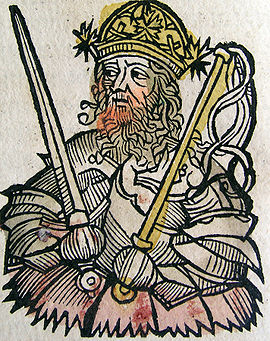Jordanes was a Roman historian of Gothic descent of
whom very little is known, but whose Getica
or De origine actibusque Getarum (On
the origin and deeds of the Goths) is an invaluable source of information on
the early history of the Goths. The only
date known about him is that he wrote his Getica
around 551 at Constantinople. This work is actually an abridgement of a work on
the same topic by Cassiodorus, but that has been completely lost. Jordanes
tells the reader that he got only two days to go through a copy of the work by
Cassiodorus, so much of this abridgement must be based on memory, but apart
from Cassiodorus, other sources are used too. As the Huns under Atilla were a
menace for the whole of Europe, including the Goths, he also paid attention to
them. The birthdate of Attila is unknown, but he died in 453 near the river Tisza
in Hungary, an area, where the Goths at that time were living as well and being
subjected to the Huns. According to Jordanes, Attila died at the night of one
of his marriages after excessive drinking and suffering from nosebleed. An
alternative version is that he was killed by one of the women of his harem. The
death of Attila left the Huns in disarray and the following year – in 454 –
they were defeated by the Goths at the battle of Nedao. This victory paved the way for the Goths to
enter Italy, settle there and in effect take over the government, with emperor
Theodoric the Great (454-526) as one of the best rulers of Late Antiquity,
whose legacy can still be seen at
Ravenna.
As politicians nowadays time and again tell us to
learn from history – professional historians are more cautious in this matter –
I have been pondering about what to learn from this episode and I came to the
following conclusion: don’t get too
drunk at your marriage!
Jordanes, Getica
c.59
XLIX. 254 Qui,
ut Priscus istoricus refert, exitus sui tempore puellam Ildico nomine decoram
valde sibi in matrimonio post innumerabiles uxores, ut mos erat gentis illius,
socians eiusque in nuptiis hilaritate nimia resolutus, vino somnoque gravatus
resupinus iaceret, redundans sanguis, qui ei solite de naribus effluebat, dum
consuetis meatibus impeditur, itinere ferali faucibus illapsus extinxit. Ita
glorioso per bella regi temulentia pudendos exitos dedit. Sequenti vero luce
cum magna pars diei fuisset exempta, ministri regii triste aliquid suspicantes post
clamores maximos fores effringunt inveniuntque Attilae sine ullo vulnere necem
sanguinis effusione peractam puellamque demisso vultu sub velamine lacrimantem.
255 Tunc, ut gentis illius mos est, crinium parte truncata informes facies
cavis turpavere vulneribus, ut proeliator eximius non femineis lamentationibus
et lacrimis, sed sanguine lugeretur virile. De quo id accessit mirabile, ut
Marciano principi Orientis de tam feroci hoste sollicito in somnis divinitas
adsistens arcum Attilae in eadem nocte fractum ostenderet, quasi quod gens ipsa
eo telo multum praesumat. Hoc Priscus istoricus vera se dicit adtestatione
probare. Nam in tantum magnis imperiis Attila terribilis habitus est, ut eius
mortem in locum muneris superna regnantibus indicarent.
Priscus: (410 or 420 – after 472) was a Greek historian who
wrote a now mainly lost history of Byzantium , in which he also mentioned the
Huns. As a high official he went on a diplomatic mission to the court of Attila
and under emperor Marcian he was magister
officiorum, a high administrative function
exitus
sui tempore: litt. `at
the time of his death’, but as the
context makes clear, it must be `shortly before his death’.
Ildico: the name is Germanic and connected with the name
Hilda/Hilde. Probably she was a Goth.
decorus: beautiful
sibi
in matrimonio …..socians.
the classical expression for when a man gets married is: aliquam in matrimonium ducere
hilaritas,
-atis: gayety
nimia: too much
resolvo
(3): to relax
gravo (1): to make heavy
resupinus: lying on the back
redundo (1) to overflow (red-undo.
Conf. unda `wave’)
after iaceret
a cum is required
solite: usually.
naris,
-is: nostril
meatus,
-us: course, way out
itinere
ferali `by a fatal way’
faucis,
-is: throat
illabor
- illapsus: to flow
extingo
–extinx – extinctim:
to kill (eum)
temulantia: drunkenness (in classical Latin a very rare word)
pudendus: shameful
exitos: u nouns
got assimilated to o nouns
sequenti
luce: on the
following day
eximo-
exemi – exemptus: (from
time) consume, pass
regius: royal
clamor,
-oris: shouting
effringo: (3) to break open
inveniuntque Attilae sine ullo vulnere necem
sanguinis effusione peractam = inveniuntque necem Attilae sine ullo vulnere
peractam (sed) sanguinis effusione
invenio (3): to discover
vulnus, vulneris,
n.: wound
nex, necis: (violant)
death
perago
- peregi – peractus: to perform, cause
demisso
vultu: with her face
bowed down
velamen, inis
n. : veil
crinis, -is
m. : hair
trunco
(1): to cut off
informes
facies: not: `their
ugly faces’, but : `so that their faces became ugly’.
cavus: here `deep’
turpavere = turpaverunt
turpo: to deform
proeliator: warrior
eximius: extraordinary
lugeo: to lament, bewail
Marciano: Marcian (392-457) was emperor of Eastern Roma Empire
from 450 till 457.
sollicitus: worried
divinitas: god. It is strange that Jordanes speaks about a god.
Marcian was certainly Christian, but on the other hand the stories of classical
antiquity were still very much alive. cf. also superna below
arcus: bow’
ostendo (3): to show
praesumo (3): to put trust in (a Late Latin meaning of this
verb)
telum : javelin, dart, but also any weapon in general
probo (1): here: to accept as trustworthy
Attila
terribilis habitus est:
Atilla was considered as terrible by
in
locum muneris; litt.:
`instead of a boon’ ‘= `as a kind of boon
superna = superi:
the gods

Attila as pictured in the Liber Chronicarum (1493).
Links:
Jordanes: http://en.wikipedia.org/wiki/Jordanes
nice blog
ReplyDelete